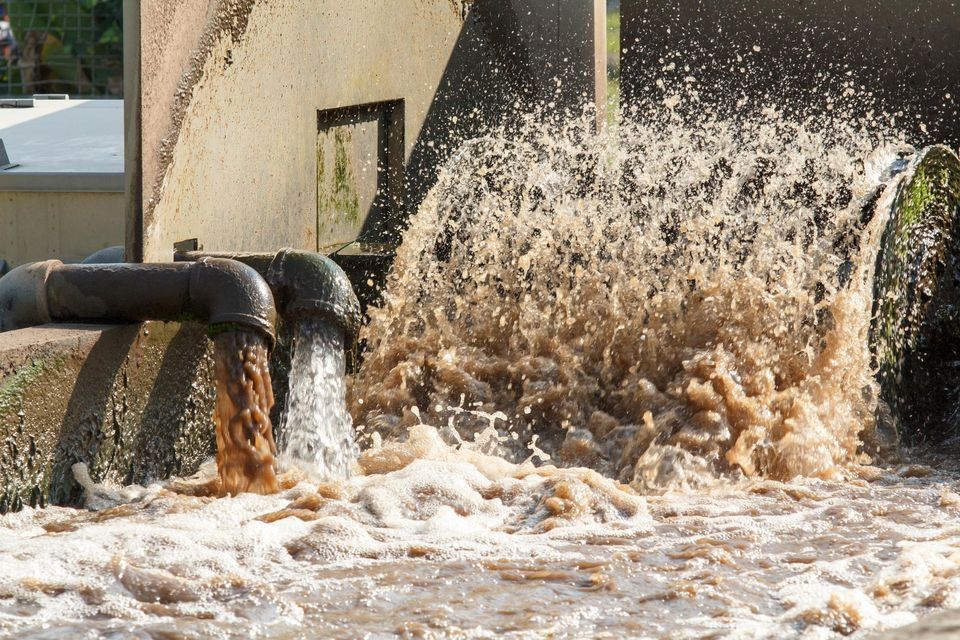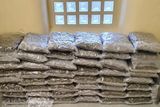Sewage outflows into the sea from treatment works ‘are up 80pc in Dublin’
Pollution from sewage plants can be a threat to human health. Stock photo
Storm water overflows into Dublin Bay from the country’s largest sewage treatment plant have surged by 80pc this year due to months of unrelenting rainfall.
The capital had the third wettest March on record, behind 2023 and 1947.
The downpours have culminated in 14 storm water overflow events in the first four months of this year when more than 1.2 billion litres of storm water released from Dublin’s Ringsend Wastewater Treatment Plant into the Liffey estuary.
This is an 80pc increase on the nine storm water overflows from the plant over the same period last year when 692 million litres were released.
Uisce Éireann said the amount of surface water entering the sewer network can be more than the capacity of the plant and the holding tanks when there is very heavy and sustained rainfall.
“In that case, to prevent the sewer network from backing up and causing flooding of roads and properties, the stormwater is released from the holding tanks to the environment,” it said.
“The stormwater tank overflow contains wastewater that is highly diluted with rainwater and has been screened and settled to remove debris — a form of primary treatment.”
However, Coastwatch director and marine ecologist Karin Dubsky said the sharp increase in the stormwater overflows was a “massive worry”.
Microbes from sewage water were a ‘health hazard for recreational users’
She added: “It’s the high rainfall but there are contributory factors such as wet wipes which are sold as flushable and can form big ropes in pumping stations and at stormwater overflows and sometimes block them.”
Ms Dubsky said microbes from sewage water were a “health hazard for recreational users”.
These types of overflows could also cause sludge-like carpets of “opportunistic algae” in the ocean which are harmful to marine life. “The opportunistic algae bothers a lot of marine life, most marine life wants clean water,” she said.
As climate change was expected to bring more rainfall, Ms Dubsky said the country would have to radically adapt to prevent the sewers from getting deluged with rainwater.
“At this stage, we have to restore wetlands and create them. Every house should have water storage from their drainpipes so there isn’t this deluge of water coming down into sewers,” she said.
She said the creation of hard surfaces outside houses for extra parking in cities was adding to the problem.
“We have to have an entire rethink of Dublin city and its surroundings and how to hold water and increase biodiversity,” Ms Dubsky said.
Met Éireann has said 2023 was provisionally the third wettest year in 83 years; 2009 remained the wettest.
Climatologist Sandra Spillane said annual average rainfall had increased by about 7pc between the two periods covering 1961-1990 and 1991-2020.
Met Éireann is currently working on completing the process of examining rainfall returns for 2023.
“Once this process completes, it is likely that the decade 2014-2023 will be ranked the wettest decade,” Dr Spillane said. “Currently, the wettest decade was 2011-2020 and the driest decade was 1967-1976 inclusive.”
Climate models examining levels of global warming thresholds predict a drop in summer rainfall and a rise in winter rainfall or precipitation.
Uisce Éireann also said it alerted local authorities and the Environmental Protection Agency of any incidents or overflow occurring at any treatment plants, which could impact the receiving waters.
The company said it was progressing with the installation of monitors on such overflows nationally, prioritising protected areas such as bathing and shellfish waters.
It said it was investing more than €500m to upgrade the Ringsend Wastewater Treatment Plant, which treats 40pc of Ireland’s wastewater.
Join the Irish Independent WhatsApp channel
Stay up to date with all the latest news















